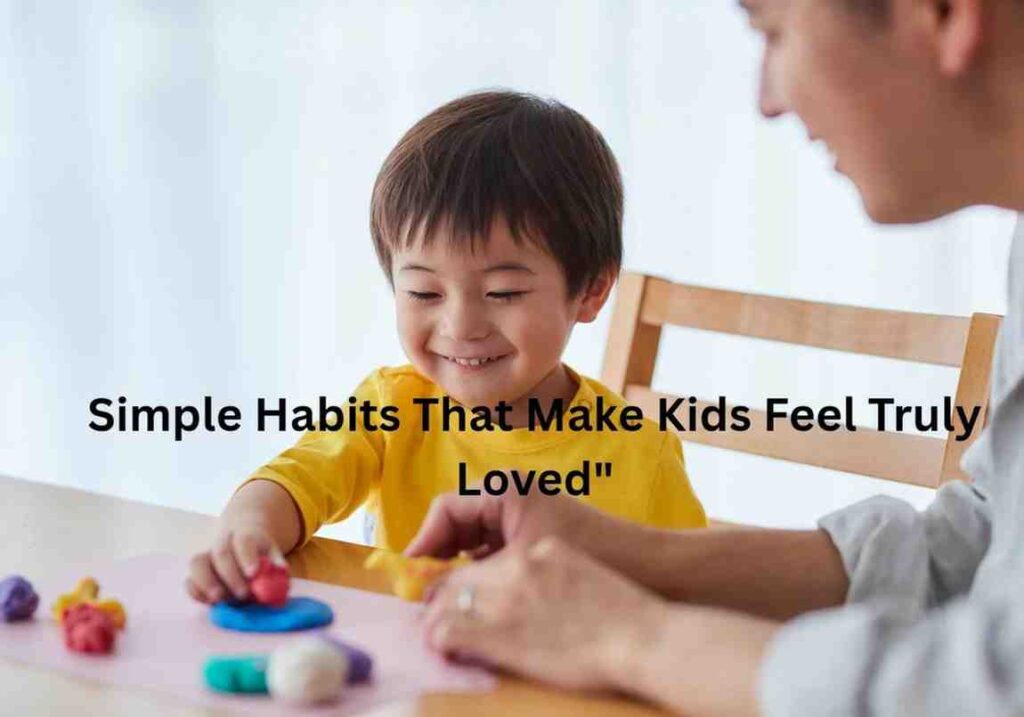5 Daily Habits That Make Kids Feel Deeply Loved — Beyond Words and Gifts

Every parent loves their child — that’s a given. But have you ever paused to wonder whether your child feels that love in the same way you’re trying to show it?
Between the chaos of school runs, lunchboxes, office deadlines, and bedtime battles, most of our daily conversations with kids sound like:
“Finish your homework.”
“Eat your veggies.”
“Stop jumping on the bed.”
Love, though deeply felt, often gets buried under responsibilities and routines. But here’s the truth — kids don’t always remember the toys we buy or the fancy vacations we take. What stays with them for life are the little, consistent moments that made them feel safe, seen, and loved.
Experts in child psychology have long said that a child’s emotional security doesn’t grow from grand gestures — it grows from steady, everyday expressions of affection and attention.
If you want your child to not just hear that you love them, but to feel it deeply — here are five daily habits that can quietly transform your bond.
1. Greet Them with Warm Eye Contact
Our children read our faces more than our words. The way we look at them when they enter a room says, “You matter here.”
Remember the famous Still Face Experiment by Dr. Ed Tronick from Harvard? Babies became visibly distressed when their mothers kept a still, unresponsive face. That simple experiment revealed just how deeply children crave emotional attunement — a smile, a nod, a twinkle in the eyes.
Try this:
When your child walks in after school or play, pause for just a few seconds. Look into their eyes, smile, and say, “Hey, I missed you today!”
That single moment of genuine connection can fill their heart far more than hours of distracted presence.
2. Use “Emotion Words” to Build Connection
It’s easy to ask, “What happened at school?” But real connection happens when we ask, “How did that make you feel?”
A 2024 study in Early Childhood Research Quarterly found that children whose parents often label emotions — like “You look proud,” or “That must have been frustrating” — develop stronger empathy and emotional regulation skills.
When you help your child name their feelings, you’re not just teaching vocabulary; you’re teaching them emotional awareness — that what happens inside them matters too.
Try this:
Next time your child is upset, instead of fixing it right away, say, “That sounds disappointing,” or “I get why that made you sad.”
Over time, this builds emotional intelligence — and a bond based on understanding, not just authority.
3. Create Tiny Rituals of Affection
Love becomes real through repetition. Little rituals are how kids feel stability.
A 2020 Journal of Family Psychology study showed that families with consistent small rituals — like bedtime stories, weekend breakfasts, or goodbye kisses — have kids with higher emotional security and lower anxiety.
Try this:
Invent a “you-only” ritual — a special handshake before school, a nightly “grateful-for” game, or a funny goodbye line like “See you in sunshine!”
These tiny traditions are emotional anchors. They remind your child that love isn’t conditional or occasional — it’s part of your everyday rhythm.
4. Listen Without Trying to Fix Everything
Parents are natural problem-solvers. We hate seeing our kids upset — so we rush to fix things.
But as Dr. Brené Brown’s research on empathy reminds us, kids feel most loved when they’re heard, not when they’re “fixed.”
Try this:
When your child shares something hard, resist the urge to offer advice for 30 seconds. Just listen. Nod. Say, “That must have been tough,” or “I understand why you felt that way.”
This simple act of validation triggers oxytocin — the brain’s bonding hormone — making your child feel safe, seen, and emotionally held. Solutions can come later; empathy should always come first.
5. End the Day with Calm Reassurance
Evenings are when children’s emotional defenses drop. They reflect on their day, replay moments, and need your warmth to fall asleep peacefully.
A 2021 Sleep Health Journal study found that kids who shared five calm, affectionate minutes with parents before bed had lower stress levels and better sleep quality.
Try this:
As you tuck them in, whisper something affirming:
“I love being your parent.”
“I’m proud of who you are.”
“I’ll always be here for you.”
These quiet sentences become their inner voice as they grow up — a voice that reminds them they are loved, no matter what.
Love Is in the Little Things
Children don’t measure love in gifts, achievements, or screen time. They measure it in presence.
In the tone of your voice. In how you look up from your phone when they speak.
In how calmly you listen when they mess up.
You don’t need perfect days or Pinterest-worthy crafts to raise emotionally strong kids. What matters is showing up — again and again — with patience, kindness, and presence.
Even on the messy days, your quiet consistency becomes their foundation of safety.
Love doesn’t need to be loud. It just needs to be steady.
Quick Takeaway: 5 Ways to Make Kids Feel Loved Every Day
1.Greet them with warm, happy eyes.
2.Talk about emotions, not just events.
3.Create small family rituals.
4.Listen first, fix later.
5.End the day with calm reassurance.
Your hugs, your patience, and your simple “I’m here for you” moments — that’s what they’ll remember for life.



